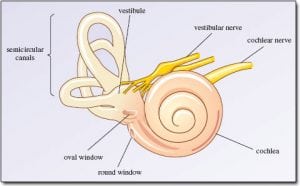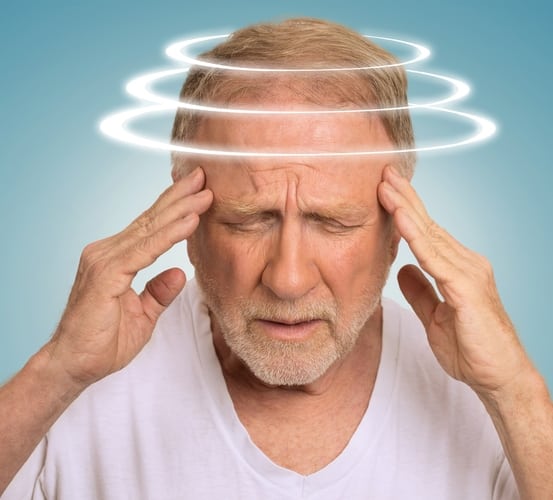Dizzy – oh? Try Physio!
Dizziness is a very common problem in more mature populations. In fact, dizziness is the most common single health related complaint for people aged 75+!
It accounts for nearly 1 in 10 of GP visits by people aged 65+ and about 1 in 5 by people aged 85+. So it’s no small problem.
Dizziness can adversely affect your quality of life whether you suffer a single bout or have a longer term problem.
It often makes you feel as though the room is spinning which causes nausea and unsteadiness and furthermore, it is associated with a high proportion of falls that cause trauma and other health issues. In severe cases it is called ‘vertigo’.
Dizziness can have several different causes. A thorough assessment is crucial to determine the system of the body most likely causing the dizziness and then targeting treatment to cure, relieve or manage the problem. We asked Richard Game, one of our experienced team of Physios to talk us through the common causes and what we can do to help…..
The most common causes relate to:
- the inner and middle ear (50%) – this can be a bacterial infection or virus called labyrinthitis. It can also be due to a condition known as Benign Paroxysmal Positional Vertigo (BPPV)
- the nervous system (30%)
- the vascular system
- and other more specific causes such as Meniere’s disease (5%)
- and Migraine (10%)
- or ischaemic vertigo (5%).
At Physio on the River we have some good news if dizziness affects you or a loved one. We are able to perform a thorough assessment for the causes of dizziness and then discuss the likely diagnosis and appropriate treatment or management.
Even better news is that the bulk of cases (50%) are treatable with very gentle manual techniques which have been shown to achieve resolution of the dizziness in up to 95% of cases.
Benign Paroxysmal Positional Vertigo (BPPV)
As previously mentioned this condition falls into the most common causes of dizziness.
What is BPPV?
It is Benign as, although it can be quite disabling, it is not due to serious disease; Paroxysmal because it occurs in short bursts of up to one minute; Positional as it is provoked specifically by movement to or from certain positions; Vertigo – dizziness defined as an illusion of movement.
Who is affected by BPPV?
BPPV is estimated to affect roughly 50% of all people at some time in their lives and, as mentioned above, it becomes progressively more common with age.
What are the symptoms of BPPV?
 The vertigo is generally rotational (like getting off a roundabout) but sometimes sufferers, on lying down, will feel that they are falling through the bottom of the bed or, on getting up, that they are being thrown back onto it.
The vertigo is generally rotational (like getting off a roundabout) but sometimes sufferers, on lying down, will feel that they are falling through the bottom of the bed or, on getting up, that they are being thrown back onto it.
The classic provoking movements to induce BPPV are: lying flat, sitting up from lying flat; turning over in bed; looking up (e.g. hanging washing) or bending down, especially if also looking to the side. The duration of the vertigo is brief; usually five to 30 seconds but very occasionally lasts up to two minutes.
However, some of these symptoms are common to other causes so it is important to have a full assessment so that you can be tested to differentiate from other diagnoses and causes.
What causes BPPV?
 BPPV is caused when loose chalk crystals get into the wrong part of the inner ear. These microscopic crystals should be embedded in a lump of jelly. The crystals weigh the jelly down and make that part of the ear sensitive to gravity.
BPPV is caused when loose chalk crystals get into the wrong part of the inner ear. These microscopic crystals should be embedded in a lump of jelly. The crystals weigh the jelly down and make that part of the ear sensitive to gravity.
The crystals are constantly being re-absorbed and re-formed and over time fragments come loose. Lying flat can then occasionally cause some of the loose debris to fall into one of the semi-circular canals; the parts of the ear responsible for sensing rotation. Movement in the plane of the affected canal causes the crystals to move along the canal, stimulating it and giving the sensation of rotation.
How can Physio help?
Most cases that do not resolve rapidly can now be relieved by the appropriate Particle Repositioning Manoeuvre; of which the most commonly performed is the Epley Manoeuvre which offers instant relief of symptoms in 9 out of 10 patients.
So why wait? Book in for an assessment and at the very least, you’ll get directed to the most appropriate care for your needs.
To book an appointment with one of our Physio team:
You can do this online by clicking the Book Now button at the top of this page, call 020 8876 5690, email by clicking here or pop in for a chat if you are passing!



